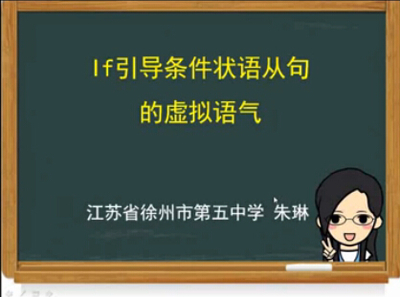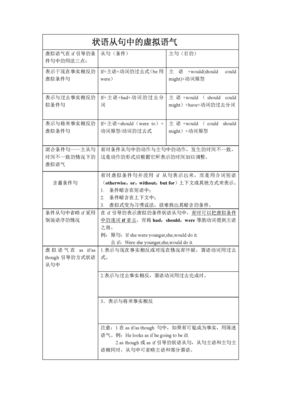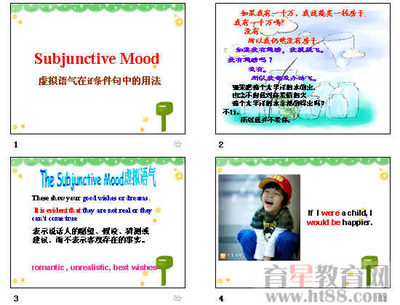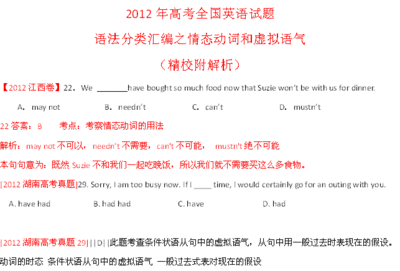虚拟语气的分类在表示一种纯然假想的情况或主观愿望时,动词需用一种特殊形式,称为虚拟语气。虚拟语气在形式上大致分为三类:
1)现在虚拟语气——主要用动词原形:
Good bless you. 愿上帝保佑你。
It is essential that the ban be lifted. 解除禁令至关重要。
She petitioned the king that her father be pardoned.她恳求国王赦免她的父亲。
2)过去虚拟语气——和陈述语气的过去式相同,但动词be要用were形式:
Imagine your child played truant. 设想你的孩子逃学。
She treated me as though I were (was) a stranger. 她待我如陌生人。
If only I were not so nervous. 我要是不那么紧张就好了。
3)过去完成形式——和陈述语句中的过去完成时相同:
I wish I hadn’t done so. 但愿我没这样做。
If I had seen her, I would have told her. 如果我见到她,我就会告诉她了。
If only I had listened to your advice. 我要是听了你的劝告就好了。
有些情态动词,特别是should,would,might,could常用在虚拟语气中。
虚拟条件句
包含条件从句的句子都是条件句,有些条件句是可能实现的,如:
If I have time I’ll come over to see you. 如果我有时间我就来看你。
If we leave now, we can still catch the train.如果我们现在动身,还可能赶上火车。
I won’t go to the party unless they invite me.除非他们邀请我,否则我不会参加这个晚会。
If you are waiting for a bus you’d better join the queue.如果你是在等车,你最好排队。
If he has written the letter, I’ll post it. 如果他已把信写好,我就去发。
这种条件句称为真实条件句(Sentences of RealCondition)。另有一些条件句表示纯然假想的情况,称为虚拟条件句(Sentences of UnrealCondition),在这类条件句中谓语动词就需要用虚拟语气:
If I had enough money, I would buy a computer.如果我有足够的钱,我将买一台电脑。(但我没有)
If you had arrived a little earlier, you would haveseen her. 你要是早来一会儿就见到她了。
表示现在和将来情况的虚拟条件句
1)表示现在或将来情况的虚拟条件句,动词形式可以下表表示:
条件从句中的谓语主语谓语
相当于过去式形式would +动词原形
这类句子或表示与事实相反的情况或实现可能性不大的情况:
If I had a map I would lend it to you.如果我有地图我就借给你。(但我没有)
If you left your bicycle outside, someone wouldsteal it. 如果你把自行车放在外边,有人会偷的。(当然你不会这样做)
If I dyed my hair blue everyone would laugh atme. 如果我把头发染成蓝色,谁都会笑我的。(当然我不会干这样的傻事)
If I lived near my office, I’d walk to work.如果我住在办公室附近,我就会步行上班。
If I were you I’d plant some trees round thehouse. 如果我是你,我会在房子周围种些树。
If Helen were (was) here how nice it would be!海伦要是在这里该多好!
在if I were you 这样的句子中,were不能改成was,但在第三人称单数后(如最后一句)用was也可以。
2)在主句中谓语有时也可用might,could构成:
If you tried again you might succeed. 如果再试一次,你可能会成功。
If I could type, I might save a lot of time.如果我会打字,我可能会节省大量时间。
If I knew her number I could ring her up.我要是知道她的号码我就能给她打电话。
If he had a permit he could get a job.如果他有许可证,他可以找到一份工作。
3)在条件从句中有时还可以用“were to +不定式”(a)或“should +不定式”(b)这两种形式:
a.If he were (was) to resign, who would take hisplace? 如果他要辞职,谁来接替他?
If I were to do the job, I would do it in a different way.要是我来做这工作,我会是另一种做法。
b.If you should have any difficulty in getting themedicine, (you could) ring this number.如果你找这种药有困难,(你可以)拨打这个电话。
If the toys should arrive in a damaged condition, pleaseinform us at once. 如果这些玩具运到时有损坏,请立即通知我们。
在后面这类句子中,主语的谓语有时可用祈使语气(见上例),或用陈述语气:
If I should be free tomorrow, I will come to see you.如果明天我有空我会来看你的。
4)在某些条件从句(如包括were和should的从句)中,if有时可省略,这时语序要改为倒装:
Were I Tom I would refuse. 如果我是汤姆我会拒绝。
Were I in your shoes I would let him know what I thoughtof him. 如果我处于你的地位,我会让他知道我对他的看法。
Should you require anything just give me a ring.你要是需要什么就给我打个电话。
Should she be interested, I’ll phone her.如果她有兴趣,我会给她打电话。
5)从句有时可用If it were not for 这种句型,表示“若不是”:
If it weren’t for your help, we would be in serioustrouble. 若不是你帮忙,我们会遇到大麻烦。
Were it not for their loan, our life would be verydifficult. 要不是有他们的贷款,我们的生活会很困难。
You wouldn’t be anywhere if it weren’t for Ruth.要不是露丝你不会有任何成就。
6)在极少情况下,从句中的谓语可用动词原形,主句中的谓语可用陈述语气:
If any person be found guilty, he shall have the right ofappeal. 如果有人被判定有罪,他应有上诉权。
If that be the official view, it cannot be accepted.如果这是官方的看法,这是不能接受的。
If any vehicle be found parked on these premises, it shallbe towed away. 如果发现有车停在此处,它将被拖走。
这是比较大气的说法,口语中很少使用。
表示过去情况的虚拟条件句。
1)表示过去情况的虚拟条件句动词形式可以下表表示:
条件从句的谓语主语谓语had
相当于过去式的形式would have + 过去分词
这类从句表示一个与事实相反的过去情况(’d是had/would的紧缩形式):
If I had known that you were coming, I would havemet you at the airport. 如果我知道你要来,我就会去机场接你。(但我不知道)
If anything had happened, he would have let usknow. 如果发生了什么情况,他早就通知我们了。(相必没发生什么事)
She would have said more if he had not walkedaway. 如果他没走开,她还会多说些话。
If I had left sooner, I’d have caughtthe bus. 如果早点动身,我就赶上巴士了。
If I had been Nancy, I wouldn’t have left him.我要是南希,我不会离开他。
What would you have done if you’d beenin my position? 如果你处于我的位置你会怎么办?
在主句中,如果主语是第一人称,也有人用should构成谓语:
I should (would) have talked to mother if I hadthought of it. 如果我想起了那事,我是会向母亲谈及的。
I should (would) never have done it if I hadn’tbeen so hard up. 如果手头不是那样拮据,我是不会那样做的。
2)主句中也可用could和might构成谓语:
No doubt I could have earned something if I hadreally meant to. 如果我有心挣点钱,我肯定会挣到一些的。
If my father had lived, he could have done allthis for me. 如果我父亲活着,这一切他都会帮我做的。
If I had been less cautious, I might have beenwiser. 如果我少一些谨慎,也许就会多一些明智。
If we had found him earlier we might have savedhis life. 如果我们早点找到他,我们或许已把他救活了。
有时还可由should(应当)构成:
If he had received the present, he should havethanked her. 如果他收到了礼物,他是应当向她道谢的。
If he had apologized, you should have done sotoo. 如果他道歉了,你也应当这样做。
2)从句中也可用had not been for来构成谓语,表示“要不是”:
If it hadn’t been for your timely help, we would have gotinto serious trouble. 要不是你及时帮助,我们会陷入严重的困境。
If it hadn’t been for her meticulous care, I wouldn’thave got well so soon. 要不是有她精心的照顾,我不会好得这样快。
If it hadn’t been for Margaret, I might not haveunderstood. 要不是有玛格丽特,我也许不会明白的。
3)if有时可以省略,但后面部分需改为倒装语序:
Had she been asked, she would have done it.如果那时请她做,她是会这样做的。
Had I not seen it with my own eyes, I would not havebelieved it. 这事要不是我亲眼所见,我都不会相信的。
Had it not been for their support, we couldn’t have wonthe election. 要不是有他们的支持我们不可能赢得选举。
Had Mark been in charge, it wouldn’t have happened.如果是马柯负责,这事就不会发生了。
一些特殊的虚拟条件句
1)错综时间条件句:
有些条件句主句谓语和从句谓语表示的动作在时间上并不一致,这类句子称为错综时间条件句(Conditional Sentences ofMixed Time),如:
If the weather had been more favorable, the cropswould be growing still better.如果前些时候天气好一点,庄稼现在会长的更好。
If he had received six more votes, he would beour chairman now. 他要是多得六票,现在就是我们的主席了。
If you had taken her advice, you wouldn’t be insuch trouble now. 如果你听了她的劝告,你现在就不会有这种麻烦。
If it hadn’t been for the doctors’ care, I wouldn’t bespeaking to you now. 要不是有医生们的照顾,我此时不会在和你说话。
If he were leaving, you would have heard aboutit. 如果他真的要走,你早就听到消息了。
If he had been trying hard, her parents wouldn’tbe so worried. 如果她一直很努力,她的父母也不会这样着急了。
2)含蓄条件句:
有些句子虽不含条件从句,但意思和条件句差不多,这种句子称为含蓄条件句(Sentences of ImpliedCondition),在这种句子中也可能需用虚拟语气:
I might see her personally, it would be better.我可能亲自去见她,这样会好一些。
I would have written before but I have been ill.要不是病了,我早给你写信了。
But for my money that woman would have persecuted him.若不是我花了钱那女人早就找上他的麻烦了。
I did not press the point as it would have been useless.我没有坚持这一点,因为坚持也没用。
In the old days she would have argued. 要是在过去她早就争论上了。
Such a thing wouldn’t have happened elsewhere.这样的事别处是不会发生的。
Anybody else would have believed you. 要换上别人早就信了你的话。
To have told my secret would have given me away.讲出我的秘密就等于出卖了我。
I wouldn’t worry about it. It wouldn’t do any good.我不会为此发愁,这样没好处。
She would have done anything to make amends.她愿做任何事来赔罪。
3)某些情态动词的使用:
某些情态动词,特别是should,would,could,might,在口语中用得很多,使语气变得客气委婉:
Would you mind shutting the window? 劳驾把窗子关上好吗?
Would you tell me how to get to the tube?可否请告诉我怎么去地铁站?
When would it be convenient for you to begin?你何时开始比较方便?
Seattle wouldn’t suit her. 西雅图不会适合她的。
I’d go there with you. 我将和你一道去。
I should be glad to talk to him. 我愿和他谈谈。
I should think you would be above anything like that.我想你不会做出这样的事来。
I should find it very hard to believe. 我会觉得这难以置信。
I should have preferred him to do it in a different way.我倒宁愿他以另一种方式来处理此事。
Could you lend me your computer? 你可否把电脑借我用一下?
I could come earlier, if necessary. 如有必要我可以早点来。
No one could be more generous; he has a heart of gold.谁也没他慷慨;他有一颗金子般的心。
Might I ask for a photograph of Mr. Strakov?我可否要一张斯特拉可夫先生的照片?
If necessary, you might shorten it. 必要的话你可以把它缩短。
I might have come to a wrong conclusion.我也许得出了错误的结论。
这类句子的谓语虽不一定是虚拟语气,却很接近虚拟语气。一是它们在形式上和虚拟条件句中的谓语形式很相近;二是它们不受时态的限制,现在情况可以过去形式表示;三是和一般陈述语气有些差异,更带主观色彩。因此,说它们是虚拟语气或接近虚拟语气也未尝不可。
虚拟语气在宾语从句中的运用
在某些动词后的宾语从句中需用虚拟语气:
1)wish后的宾语从句:
在wish后的宾语从句中谓语主要有两种形式(表示与事实相反的情况):
a.用过去式表示现在情况,动词be用were时较多(也有人用was):
I wish I knew what was going to happen.但愿我知道将要发生什么事。
I wish I could help you. 但愿我能帮助你。(但我不能)
I wish I had more time. 但愿我有更多的时间。
I wish I were (was) young again. 真希望我能再年轻一次。
b. 用相当于过去完成时的形式,表示过去的情况(常有遗憾的味道):
I wish (that) I had listened to your advice.我要是听你的劝告就好了。
My father wishes (that) he had gone touniversity. 我父亲很希望自己上过大学。
I wish you hadn’t told me all this.但愿你没告诉我这一切。
She wished she hadn’t come. 她但愿自己没来。
间或用would构成谓语:
I wish he wouldn’t go out every night. 但愿他不要每晚都出去。

I wish you wouldn’t be so noisy. 但愿你别这么吵。
2)would rather (sooner)后的宾语从句:
谓语多用相当于过去式的形式,表示现在或将来的情况:
I’d rather you know that now, than afterwards.我宁愿你现在知道而不是将来知道。
“Do you mind if I smoke here?” “I’d rather you didn’t.”“我在此抽烟你介意吗?”“我倒是希望你别抽。”
I would rather you told me the truth. 我宁愿你给我讲真话。
I’d sooner you didn’t ask me that question.我宁愿你别问我那个问题。
在had rather和prefer后的宾语从句中有时也可用虚拟语气:
I had rather you did it. 我宁愿你做这事。
She preferred that he should do the washing-up in thekitchen. 她宁愿他在厨房里洗碗碟。
在suppose后的宾语从句中也可能包含虚拟语气:
Suppose her father turned her out of doors!设想她父亲把她撵出家门!
Suppose they did not believe him what would they do tohim? 假如他们不相信他的话,他们会把他怎么样?
3)suggest,demand,insist,ask这类动词后的宾语从句:
从这类从句中美国人多用动词原形(也就是现在虚拟语气):
He suggested that a petition (should) be drawn up.他建议起草一份请愿书。
She demanded that I pay her immediately. 她要求我立即付款给她。
He insisted that Jennie send her to dancing school.他坚持要珍妮送她进舞蹈学校。
He asks that he be given an opportunity to explain his case.他要求给他机会解释他的情况。
I advise that he go at once. 我建议他马上就去。
I propose that Mr. Parr be the chairman. 我提议帕尔先生担任主席。
She urged that he write and accept the post.她催促他写信去接受这个职位。
Congress has voted that the present law be maintained.国会投票决定维持现行法律。
He requested that the Premier grant him an interview.他请求总理接见他。
He commanded that we (should) attack at once.他命令我们立即进攻。
The Queen desires that you (should) come at once.女王希望你马上来。
I move that we accept the proposal. 我提议通过这项提案。
He ordered that the man be released. 他命令释放那人。
I recommend that everyone (should) buy this dictionary.我建议这字典每个人买一本。
He requires that they (should) work all night.他要求他们通宵工作。
The Senate has decreed that such students not be exemptedfrom college dues. 参议院规定这样的学生不能免交学费。
They intended that the news (should) be suppressed.他们打算封锁这条消息。
She petitioned the king that her son (should) be pardoned.她恳求国王宽恕她的儿子。
英国人过去多用“should+动词原形”作这类从句中的谓语,但现在用原形的人也越来越多了,另外这类句子也可变为被动语态,宾语丛句则成了主语从句:
It is suggested that we make a special study of theproblem. 有人建议我们对这问题作专门研究。
It was intended that you be the candidate. 打算让你作候选人。
It was proposed that this matter be discussed at the nextmeeting. 有人提议这问题下次会上再议。
It is requested that a vote be taken. 有人提请投票表决。
虚拟语气在主语、表语等从句中的运用
虚拟语气还可在主语、表语及同位语从句中使用:
1)虚拟语气在主语从句中的使用:
It is important that he work hard.他努力工作是很重要的。
It is essential that this mission not fail.这项任务不失败至关重要。
It is appropriate that this tax be abolished.废除这项税收是合适的。
It’s imperative that you (should) not be seen here.你不要在这里露面,这很要紧。
It’s vital to her health that she take thismedicine. 她吃这药对她的身体非常重要。
另外,在有些这类结构的句子中,主语从句的谓语由“should+动词原形”构成,这时多带有一些情感色彩,可译为“竟然”等(表示一种不可思议的状况):
It seems so unfair that this should happen to me.我身上竟发生这样的事,这似乎很不公平。
I think it is dreadful that anyone should be somiserable. 有人竟然这样悲惨,我感到太可怕了。
It’s strange that she should be so late.真奇怪,她竟然来得这样晚。
It’s surprising that they should pass the time likethat. 他们竟然这样来打发时间真令人惊讶。
It’s natural that you should forget it.你忘掉这事是很自然的。
That they should do such a wicked thing isunthinkable. 他们竟然做这样不道德的事真是不可思议。
2)用在表语从句中的虚拟语气:
Our decision is that the school remain closed.我们的决定是学校暂不开学。
Sophia’s idea was that they should lock up thehouse. 索菲亚的想法是他们把屋子锁上。
My suggestion is that we take the6:00 train. 我的建议是搭六点的火车。
Their requirement is that every member attend atleast one meeting per year. 他们的要求是每个会员每年至少参加一次会议。
3)用在同位语从句中的虚拟语气:
He made the suggestion that they carry on theirconversation in Japanese. 他建议他们用日语接着交谈。
There have been demands that the prime minister shouldresign. 有人要求首相辞职。
They expressed the wish that they be given morefree time. 他们表示希望给他们更多的空闲时间。
The resolution that women be allowed to join thesociety was carried. 允许妇女加入该协会的决议通过了。
虚拟语气在状语从句中的运用
在某些状语从句中,谓语有时用虚拟语气,特别是在下面几类状语中:
1)as if,as though引导的状语从句:
这类状语从句中的谓语形式和一般虚拟语气差不多,表示现在情况时用过去虚拟语气(a),表示过去情况时用完成形式(b):
a.I have loved you as if you were my son.我爱你就像你是我的亲儿子。
I remembered it vividly as though it were tonight.这事我记得很清楚就像发生在今晚似的。
He behaves as if he owned the place.他表现得像是这地方的主人。
He talks as though he knew where she was.他谈起来仿佛他知道她在哪儿似的。
b.He talks (talked) about Rome as though hehad been there himself. 他谈起罗马就仿佛他到过那里似的。
Fancy you sitting there as if nothing had happened.瞧你坐在那里好像什么事也没发生似的。
He looks (looked) as though he had known Millie foryears. 他看上去就好像他认识米丽好多年了。
在look,seem,taste,smell后,as if引导的从句中可以用陈述语气:
It looks as if they are in a terrible hurry.看起来他们好像忙得要命。
It seems as if we shall have to walk. 看上去我们得步行了。
The meat tastes as if it has gone bad. 这肉吃起来好像已经坏了。
The milk smells as if it is sour. 这奶闻起来好像酸掉了。
as if (though) 还可引导表语从句:
It isn’t as if you were going away for good.又不是你一去不复返了。
It is not as though we were poor. 我们又不是穷人家。
You look as if you didn’t care. 你看上去好像不在乎的样子。
2)有些让步从句中也可能用虚拟语气,特别是某些句型,其中有些用现在虚拟语气(a),有些用may,might,would构成谓语(b):
a.Though he be the President himself, he shall hearus. 即使他是总统本人,他也得听我们讲话。
Whether she be right or wrong we will support her.不管她是对还是错。
Whatever be the reasons for his action, we cannot toleratesuch disloyalty. 不管他这样做的原因何在,我们都不能容忍这种不忠诚的行为。
b.Be that as it may, we have nothing tolose. 即使如此,我们也不损失什么。
Come what may, we will go ahead with our plan.不管发生什么情况,我们也要推行这个计划。
Poor though you might be, you cannot live all your life oncharity. 尽管你穷,你也不能一辈子靠救济过日子。
Try as I would, I cannot prevail upon him tofollow my advice. 不管想什么办法,我都不能劝说他按我的意见行事。
这些句子(特别是第一类)的从句谓语也可用陈述语气:
Though he is the President himself…
Whether she is right or wrong…
上面的b类句子可以看作是一种句型。
3)有些目的从句也可用虚拟语气作谓语(主要是用动词原形):
They removed the prisoner in order that he not disturb theproceedings any further. 他们把犯人带走以免他继续干扰诉讼进程。
The President must reject the proposal, lest it causestrife and violence. 总统必须拒绝这个提议,以免引起冲突和暴力。
Earth mounds were being hastily erected lest an attack (should)be launched that night. 正在匆忙地垒起土堆,以防那晚(敌人)会发起袭击。
但这种用法已日渐减少,现在多用would,should,could,might等构成谓语(属于陈述语气范畴)
He left early in order that the children would not bealone in the house. 他早早动身以免孩子们单独待在家里。
I lent him £50 so that he might go for a holiday.我借给他五十英镑以便他能去度假。
I hired a boat so that I could go fishing.我租了一条船以便能出去钓鱼。
He hurried on, lest she should meet him again.他匆忙往前走,以免她再碰到他。
4)在“be + 形容词”这种结构后的从句,有时用should +动词原形构成谓语:
I’m surprised that you should press the suggestion.我很奇怪你为什么会坚持你的建议。
He was amazed that some countries should expressindignation at it. 他很惊讶有些国家竟对此感到愤怒。
They’re especially anxious that you should come.他们特别期盼你能来。
They were insistent that we be ready. 他们坚持要我们做好准备。
但这类结构后的从句用陈述语句的时候可能更多一些。
虚拟语气在祝愿语中的用法
在一些表示祝愿的话语中仍可找到虚拟语气(多用动词原形):
God be praised! 愿上帝受到赞美!
God save all living beings! 愿上帝拯救众生!
Heaven forbid that I should ever say nasty things aboutyou. 我要是说你坏话上天不容。
God damn it! 该死的!
Long live peace! 和平万岁!
So be it. 就这样吧。
Please God, there hasn’t been an accident.谢天谢地,没有出事。
So help me God. 上天作证!
Far be it from me to spoil the fun. 我才不愿意扫别人的兴哩。
Curse this fog! 这讨厌的雾!
有些祝愿的话用may开始:
May you enjoy many years of health and happiness.祝您健康长寿美满幸福!
May God bless you! 愿上帝保佑你!
May there never be another world war.愿永远不再有世界大战。
It’s (high) time后的定语从句中的虚拟语气
1)在It’stime 后的定语从句中谓语要用虚拟语气(多用过去虚拟语气):
It’s time we went. 我们该走了。
It’s time we were leaving. 我们该动身了。
It’s time we ordered dinner. 现在该点菜了。
I think it’s time we were taught a lesson.我想现在是给他们一次教训的时候了。
2)在It’s high time后情况也如此:
It’s high time you bought a new car. 你该买辆新车了。
It’s high time that you made up your mind.该是你下决心的时候了。
It’s high time you got a job and settled down.你该找个工作安定下来。
在某些句型中使用的虚拟语气
在少数句型中谓语需用虚拟语气:
1)由that引导的句子(表示愿望或沮丧情绪):
Oh that the rain would stop! 但愿雨能停下来!
Oh, that I were with her now! 但愿我现在和她在一起!
That I should be accused of murder!我竟然被控谋杀!
That he should act so rudely toward you! 他竟然对你这样无礼!
2)由would that引导的句子(表示“但愿…”):
Would (that) he were gone! 但愿他已走掉!
Would that we had seen her before she died.如果在她临终前我们去看她一面就好了。
Would that he could have listened to his father.他要是能听了他父亲的话就好了。
3)由to think引导的句子(表示“没想到…”):
To think that I trusted him! 没想到我竟然信任了他!
To think he knew about it all the time! 没想到这事他一直都知道!
To think that she should have died such a tragic death.没想到她竟会死得这样惨。
某些成(短)语中包含的虚拟语气
某些成(短)语中本身就包含虚拟语气:
1)as it were (were就是虚拟语气)——通常插在句子中间,表示“姑且这么说”:
He is, as it were, a walking dictionary. 他可说是一部活字典。
He is my best friend, my second self as it were.他是我最好的朋友,可以说是我第二个自己。
The English, the Scots and the Welsh are all, as it were,members of the same family. 英格兰人、苏格兰人、威尔士人都可说是一家人。
2)would have thought——本身也是虚拟语气,表示“会想到”、“会以为”等:
Who would have thought to see you here! 谁会想到在这里见到你!
Who would have thought it was going to break like that?谁会想到它会这样碎掉?
You would have thought they would do more to help us.你原本会以为他们会更多地帮助我们。
3)if need be——表示“如果必要”:
I can earn my own living if need be.如有必要,我可以自己赚钱维持生活。
I’ll fight you if need be to the High Court.必要的话我可以和你一直打到高等法院。
If need be, I can do extra work at the weekend.倘有必要,我可以在周末加些班。
爱华网本文地址 » http://www.aihuau.com/a/25101016/317056.html
更多阅读

C1. If only he ____quietly as the doctorinstructed, he would not suffer so much now.A. lies B. lay C. had lain D. should lieb2. How I wish every family ____a large house with a beautifulgarden.A. has B. had C. will

《虚拟语气口诀1》虚拟语气,愿望难成,违背事实,时态后退.《教你18字口诀,学会if条件从句虚拟语气2》口诀:【过去了,就原了;过完了,就完了;过去了,也原了】与现在相反:从句用过去时态,主句用would,should,could,might+动原。口诀:过去了,就原了。与

虚拟条件句的三种基本类型:与现在事实相反、与过去事实相反、与将来事实相反。条件句有真实条件句和非真实(虚拟)条件句两种。真实条件句所表示的假设是有可能发生的,而非真实条件句则通常表示一种假想,与事实相反或不大可能会发生:If I

虚拟语气表示一种不能实现的假设。该语法主要用于if条件状语从句。一、if引导的条件状语从句的分类及虚拟条件句的判断1、可以把条件句分为两类:1).真实条件句(Sentences of RealCondition):凡是假设的情况发生性可能很大,就是真实条件句

【编者按】情态动词是每年高考的热点也是难点,每年单项填空题必考一题。考点集中在:情态动词表示推测的基本用法及区别;情态动词否定式的用法辨析:“情态动词+have done”的用法区别等。虚拟语气在高考命题中不是重点,但是难点。考点常





 爱华网
爱华网